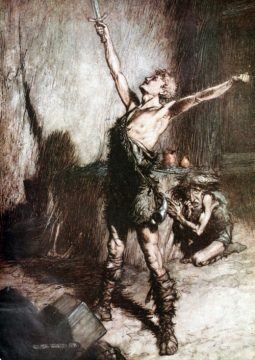Antonio Muñoz Molina at The Hudson Review:
 Music can have a decisive influence in a person’s life and in a nation’s history. Were it not for a brief passage in the second volume of Ian Kershaw’s biography of Hitler, I would never have learned of the direct connection between Wagner’s Siegfried and the first crucial victory of Franco’s army during the uprising that set off the Spanish Civil War. On July 25, 1936, as Kershaw recounts, Adolf Hitler attended a production of Siegfried in Bayreuth, which brought him to the state of exaltation that Wagner’s music had always caused in him from early youth. From the age of 17, to be precise, when he first heard Rienzi in Linz—as August Kubizek, friend, countryman and companion during his early years in his native city and then in Vienna, would reverently record years later. On that day in 1906, a young Hitler left the opera house in a fevered state of musical and patriotic excitement, rapt in a sense of kinship with the figure of the Roman tribune who in the fourteenth century tried to revive the glories of imperial Rome, only to meet, in Wagner’s opera, an heroic, glorious end at the hands of his betrayers. In June of 1936, exactly thirty years later, Hitler’s deranged dream was being fulfilled.
Music can have a decisive influence in a person’s life and in a nation’s history. Were it not for a brief passage in the second volume of Ian Kershaw’s biography of Hitler, I would never have learned of the direct connection between Wagner’s Siegfried and the first crucial victory of Franco’s army during the uprising that set off the Spanish Civil War. On July 25, 1936, as Kershaw recounts, Adolf Hitler attended a production of Siegfried in Bayreuth, which brought him to the state of exaltation that Wagner’s music had always caused in him from early youth. From the age of 17, to be precise, when he first heard Rienzi in Linz—as August Kubizek, friend, countryman and companion during his early years in his native city and then in Vienna, would reverently record years later. On that day in 1906, a young Hitler left the opera house in a fevered state of musical and patriotic excitement, rapt in a sense of kinship with the figure of the Roman tribune who in the fourteenth century tried to revive the glories of imperial Rome, only to meet, in Wagner’s opera, an heroic, glorious end at the hands of his betrayers. In June of 1936, exactly thirty years later, Hitler’s deranged dream was being fulfilled.
more here.
